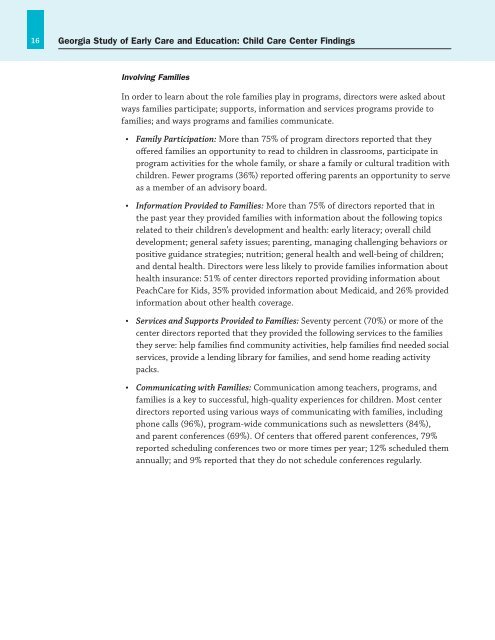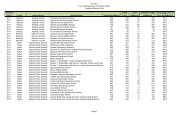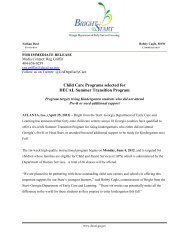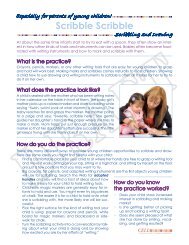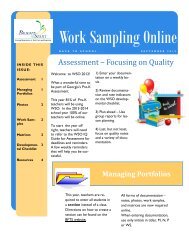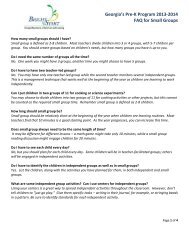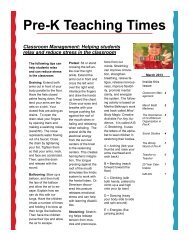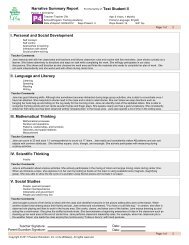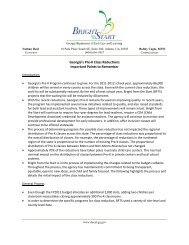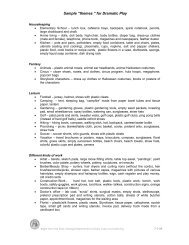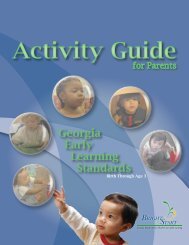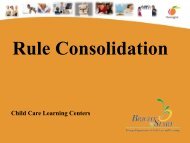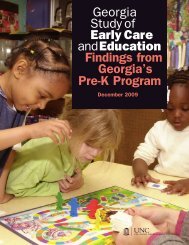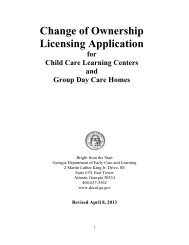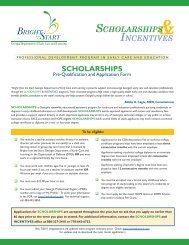Georgia Study of Early Care and Education: Child - Bright from the ...
Georgia Study of Early Care and Education: Child - Bright from the ...
Georgia Study of Early Care and Education: Child - Bright from the ...
You also want an ePaper? Increase the reach of your titles
YUMPU automatically turns print PDFs into web optimized ePapers that Google loves.
16 <strong>Georgia</strong> <strong>Study</strong> <strong>of</strong> <strong>Early</strong> <strong>Care</strong> <strong>and</strong> <strong>Education</strong>: <strong>Child</strong> <strong>Care</strong> Center Findings<br />
Involving Families<br />
In order to learn about <strong>the</strong> role families play in programs, directors were asked about<br />
ways families participate; supports, information <strong>and</strong> services programs provide to<br />
families; <strong>and</strong> ways programs <strong>and</strong> families communicate.<br />
• Family Participation: More than 75% <strong>of</strong> program directors reported that <strong>the</strong>y<br />
<strong>of</strong>fered families an opportunity to read to children in classrooms, participate in<br />
program activities for <strong>the</strong> whole family, or share a family or cultural tradition with<br />
children. Fewer programs (36%) reported <strong>of</strong>fering parents an opportunity to serve<br />
as a member <strong>of</strong> an advisory board.<br />
• Information Provided to Families: More than 75% <strong>of</strong> directors reported that in<br />
<strong>the</strong> past year <strong>the</strong>y provided families with information about <strong>the</strong> following topics<br />
related to <strong>the</strong>ir children’s development <strong>and</strong> health: early literacy; overall child<br />
development; general safety issues; parenting, managing challenging behaviors or<br />
positive guidance strategies; nutrition; general health <strong>and</strong> well-being <strong>of</strong> children;<br />
<strong>and</strong> dental health. Directors were less likely to provide families information about<br />
health insurance: 51% <strong>of</strong> center directors reported providing information about<br />
Peach<strong>Care</strong> for Kids, 35% provided information about Medicaid, <strong>and</strong> 26% provided<br />
information about o<strong>the</strong>r health coverage.<br />
• Services <strong>and</strong> Supports Provided to Families: Seventy percent (70%) or more <strong>of</strong> <strong>the</strong><br />
center directors reported that <strong>the</strong>y provided <strong>the</strong> following services to <strong>the</strong> families<br />
<strong>the</strong>y serve: help families find community activities, help families find needed social<br />
services, provide a lending library for families, <strong>and</strong> send home reading activity<br />
packs.<br />
• Communicating with Families: Communication among teachers, programs, <strong>and</strong><br />
families is a key to successful, high-quality experiences for children. Most center<br />
directors reported using various ways <strong>of</strong> communicating with families, including<br />
phone calls (96%), program-wide communications such as newsletters (84%),<br />
<strong>and</strong> parent conferences (69%). Of centers that <strong>of</strong>fered parent conferences, 79%<br />
reported scheduling conferences two or more times per year; 12% scheduled <strong>the</strong>m<br />
annually; <strong>and</strong> 9% reported that <strong>the</strong>y do not schedule conferences regularly.


